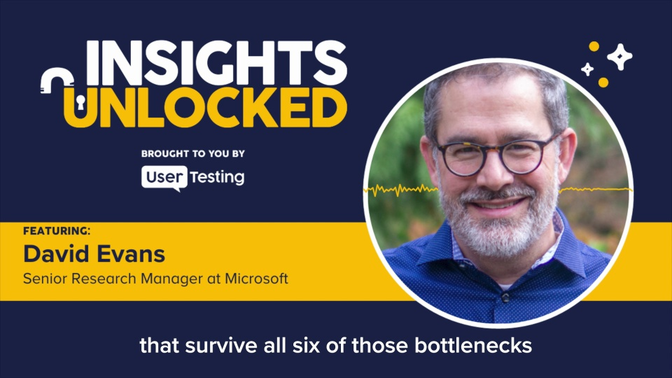
Episode 98 | October 30, 2023
Leveraging the 6 UX bottlenecks to transform your business
In this Insights Unlocked episode, Liz Miller from Constellation Research talks with Dr. David Evans, a Senior Research Manager at Microsoft, about why certain designs work and others fail and what that may mean for your organization.
Leveraging the 6 UX bottlenecks to transform your business
Is your company built to have the same customers 30 years from now?
That is a question asked by Dr. David Evan, a Senior Research Manager at Microsoft and author of Bottlenecks: Aligning UX Design with User Psychology.
Better understanding the psychology of your users—and addressing their needs—will help keep them customers for longer, he said.
In this episode of Insights Unlocked, Constellation Research’s Liz Miller talks with David about the intersection of UX design and user psychology.
Bottlenecks, David says, represent the psychological constraints people have when interacting with digital products.
“When I started doing UX research and I was seeing all of these psychological processes at play, it just really struck me that people are really built to filter,” David said. “So this idea of UX bottlenecks is that people are equipped with really powerful constrictions where they block out noise and they focus on what's meaningful to them.”
He has identified six key bottlenecks: attention, perception, memory, disposition, motivation, and social influence.
The discussion highlights the importance of understanding these bottlenecks in the context of designing user experiences.
“People don't buy products, they buy a better version of themselves,” David said, referencing a colleague’s favorite saying. “As you think about aligning with that, then all the rest of it really falls into place.”

David emphasizes that these bottlenecks are not shortcomings of users but rather intrinsic aspects of human cognition. The conversation touches upon the evolution of these bottlenecks and how they serve as adaptive mechanisms for concentration and focus in a world inundated with information.
David believes it’s a misconception that people have shrinking attention spans. Rather, it’s an overload of information that is affecting people's ability to concentrate.
“If the only thing you think you need to do with your customers is get their attention, what happens is: you might survive the attention bottleneck, but you get killed in the perception because everyone perceives you instantly as abusive,” David said. “You’ve got to think of your customers over the long term.”









